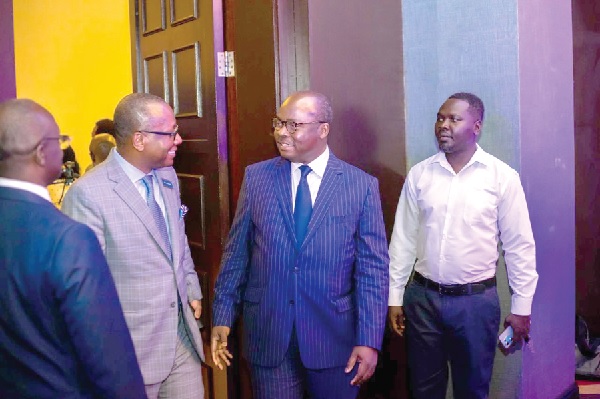
GHIB expands footprints in Africa — Focuses on SME trade finance
Ghana International Bank (GHIB) says it has realigned its strategy to focus more on trade finance of SMEs in Ghana and beyond as the bank begins expansion of its trade finance footprints to sub-Saharan Africa.
Advertisement
In an exclusive interview with the Graphic Business, the Chief Executive Officer of GHIB, Dean Adansi, said “on the trade side, there is tremendous opportunity for us to assist SMEs in Ghana and Africa”, adding that already the bank was beginning to see success in that area as it supported a number of SMEs in their pre and post shipment financial needs.
Mr Adansi said there was significant amount of potential in Africa to expand the bank’s trade finance services, noting that “the biggest impediments that Africa faces in its development requirement is capital” emphasising the point that the capital requirement needed for sub-saharan Africa was miniscule in comparison to global capital.
“We all have a responsibility to tell the world how exciting and how much opportunity there is in Africa to dispel the notion that Africa is extremely risky,” Dean said.
The CEO said after operating in Ghana and West Africa over the past 65 years, the bank has gained a lot of goodwill in addition to its proven track record of working with local banks in West Africa and that these two points, among others, would help push the bank as it extends its trade finance across sub-saharan Africa.
“We have the right strategy, have strong governance structures, are aggressive and we will succeed,” he stated.
Over the past 65 years GHIB has made great strides and has grown to become a systematically important player in trade finance for banks in especially West Africa.
Such is the importance of the trade finance bank in West Africa that some economies in the sub-region would suffer without the bank’s services. For instance in 2023, GHIB intermediated over $8 billion in payments for financial institutions in West Africa.
Mr Adansi said: “65 years is a long time, a lot has been achieved and it is time the world knew what GHIB has done in supporting a lot of the economies in West Africa.”
The bank has been able to weather the storm since the financial crisis through prudent financial management, risk management and understanding the market in which it operates.
Among the bank’s success story it’s participation in the yearly syndicated loans of COCOBOD to purchase cocoa beans, adding that “the work we do alone for COCOBOD is impactful”.
Analysts said it would not be an overstatement to say GHIB is a systematically important financial institution in Ghana and Anglophone West Africa because for the past 50 years, the financial world has experienced turmoil: from the UK’s own balance of payments crisis in the early 1970s, to OPEC’s embargo, to the inflationary years of the early 1980s, to the Gulf War in the 1990’s, and the great financial panic of the late 2000’s.
However, GHIB has continued to be an important and relevant institution through all these crises with the tireless efforts of the board, shareholders, executive management, and all well-meaning stakeholders.
Pillar of strength
According to the Board Chair of GHIB, Dr Ernest Addison, the “bank remains a pillar of strength and the indispensable Ghanaian financial institution”.
Mr Adansi said the fact that the bank has proven to be resilient over the past 65 years in the City of London, which is the centre of financial services of the world, should be a source of pride for all Ghanaians that GHIB has survived all these financial and inflationary pressures during the period of its operations.
With an estimated $80 billion in the global trade finance gap, the CEO said the huge gap in trade finance presented an opportunity for the bank to expand its operations to sub-saharan africa, saying “there is still not enough capital in the market to address that gap”.
GHIB, he believes, can play a key role in the trade finance business especially in Ghana and West African and the entire Sub-Saharan Africa.
In expanding its footprints, the bank intends to partner local banks and complement their businesses rather than competing with local banks, a strategy it has maintained over the past 65 years.
For the full interview visit GRAPHICONLINETV on YouTube





